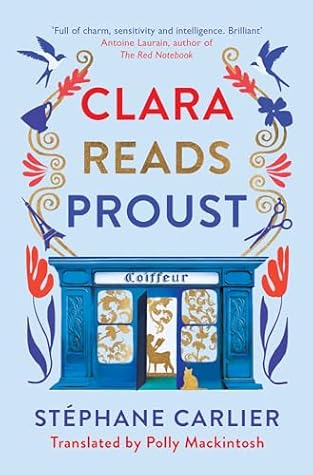More on this book
Kindle Notes & Highlights
She has only read about twelve pages, but she already knows how their relationship is going to play out. She will have to work hard and persevere with him, often through fog, sometimes in darkness, not be put off by his use of nested sentences and the imperfect subjective, exercising patience and a dictionary when necessary. And he, upon regular intervals, will blow her away just when she is least expecting it.
Today she started reading a book that was written over a hundred years ago by a man who never left his bed, a book with interminable sentences and which she feels, for a reason she still cannot understand, will make her stronger.
The feeling of happiness the third time around was so strong that she considered turning to the people sitting near her and saying: It’s crazy, this thing about the madeleine that brings back the past; have you experienced that before too?
‘He wants to remain in the memory, so he drinks more tea, but it has less and less of an effect. A bit like waking up from a dream. The more you try to remember it, the less you’re able to. Have you noticed that?’
The book demands so much engagement; it establishes such a strong, all-encompassing relationship with the reader that it might seem to them that the people around them are conspiring to ruin their enjoyment.
The thing she likes most is the rhythm it imposes. You are forced to take your time while also paying attention – it is very unique like that. How many times while reading has her mind wandered from the words on the page to making a shopping list or thinking back to a conversation she had at the salon during the day? Time and attention, relaxation and concentration. Proust is her yoga.
When the past emerges in the present, is it not a continuation of it? Isn’t a memory more real than the time it comes from? Why do we seem to remember things better and better as we grow older?
Proust isn’t difficult, it’s just different. But still, he could start a new paragraph a little more often.
He may not have explicitly written a guide to surviving painful break-ups, but there is no one quite like Marcel for comforting the forsaken reader.
He does this first of all by making them smarter, which is not insignificant, but also by making them realise that love does not exist, that it is just an invention of our brains in response to our own existential frustration and fear of abandonment, that the person we think we are in love with is nothing like who they are really, that we desire them because they elude us and that once we have them, we cannot remember what made us desire them, and that anyway, we are irredeemably alone, so in love, either we suffer terribly or we become bored to death.
How is it possible to miss someone who took up too much space when they were there? To be upset that you no longer have them when you no longer wanted them? What does she miss, exactly? Because she still wouldn’t want to have him back . . .
Not much is certain about this life, and it is only becoming less so, but there is this: we don’t realise the extent to which our fates have been shaped by others.


